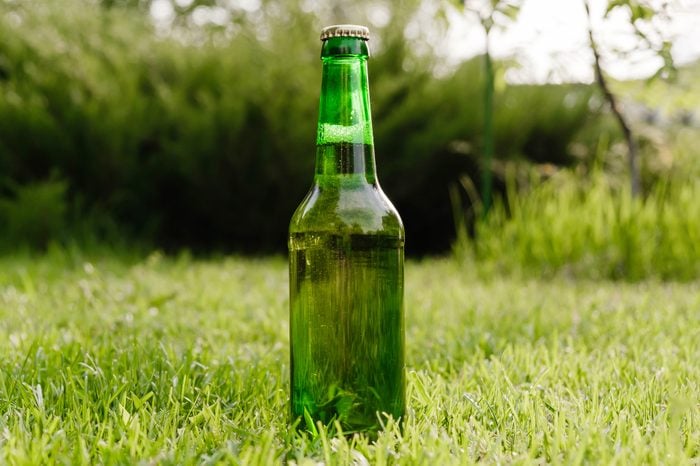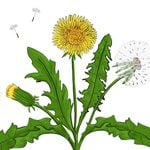Can You Really Fertilize Your Lawn with Beer?

Some say your lawn needs beer as much as you do after a long day of lawn care! Let's find out if beer grass fertilizer is really a thing.
Our editors and experts handpick every product we feature. We may earn a commission from your purchases.
You can’t be a serious lawn owner without hearing the pitch about fertilizing your lawn with beer. Google it. You’ll find many recipes involving a hose-end sprayer and a 12-pack of cheap beer.
I’ve been working with professional turf managers a long time, and I base my lawn care recommendations on facts and sound agronomic principles. Using beer as lawn food is not one of them. But that’s not to say there isn’t some small benefit to dumping beer on your lawn. Let’s dive in.
On This Page
How Does It Work?
A good definition of fertilizer is: Compounds given to plants with the intention of promoting growth. As a fertilizer, beer has nothing to offer because it does not promote growth. There is no nitrogen, phosphorus, potassium or any of the remaining 16 essential nutrients needed to promote vegetative growth.
If beer was the only “plant food” you gave your lawn, it would slowly starve. That’s why brew-based fertilizers contain other ingredients like Epsom salts, household ammonia, corn syrup or molasses, liquid dish soap and mouthwash. Yes, mouthwash.
Surprisingly, all of these have subtle value as lawn treatments:
- Epsom salts is another name for magnesium sulfate. Magnesium and sulfur play essential roles in good shrub, flower and ground cover health. You’ll often find these important macronutrients in higher-end professional turf fertilizers. Magnesium helps with chlorophyll production while sulfur is found in many critical proteins within turfgrasses. These make your lawn greener without a flush of growth.
- Household ammonia gives your lawn a small dose of nitrogen, the nutrient your lawn uses more than any other. Nitrogen makes your lawn green and generates top growth. However, the amount of nitrogen your grass gets from a cup of ammonia is insignificant. Plus, it’s unstable and would quickly dissipate into the atmosphere. Fun fact: The air we breathe is 78 percent nitrogen.
- Corn syrup and molasses are simple sugars. Sugar is a food source for the billions of beneficial microbes in your soil. These important microbes, made up of beneficial bacteria and fungi, are necessary to help maintain soil health, which translates into healthy grass. Feeding them carbohydrates like sugar helps them grow exponentially in a matter of hours.
- Liquid dish soap acts as a wetting agent that moves these ingredients through the turf and into the soil, where they need to be. This may be the most valued component of a beer-based lawn potion.
- Mouthwash is believed to kill insects and grubs. I can find no substance to this claim, but it may have something to do with the alcohol content. But be warned: It may also kill beneficial microbes critical for nurturing good soil health. The only sure method to kill grubs with mouthwash is to squash them with the bottle.
Does Beer Really Help Your Lawn?
Scientifically, that would be a big “not really.” A typical beer contains six to 15 carbohydrate grams per 12-oz. can. These carbs are a food source for microbes that improve soil health and help it convert nitrogen to a form grass roots can consume.
However, you’re not applying enough beer to your lawn to make a difference. And no research has determined how many ounces per 1,000 square feet would meet a threshold of significance.
Alternative Methods to Using Beer
You can improve soil health much more efficiently and with less fuss by fertilizing your lawn with a high-quality, Organic Materials Review Institute-listed organic fertilizer like Scotts Natural Lawn Food or Lawnbox Fall Fix 100% Organic Grass Fertilizer.
These and other natural fertilizers effectively feed the soil and your grass at the same time. Meal fertilizers (blood, meat, soybean, kelp and feather) also keep those microbes well-fed while slowly feeding your lawn in a safe, environmentally friendly way.
The Verdict
It’s easy to be lured into bogus methods to take care of your lawn, like wearing golf shoes to aerate while you mow, killing weeds with salt or letting your lawn to go to seed so it will reseed itself. Using beer or other household products as alternatives to sound environmental and agronomic principles falls way short of delivering the promised results.
Go ahead and experiment if you’d like. But remember, when you buy conventional lawn fertilizer again, if the label doesn’t show nitrogen, phosphorous and/or potassium as key ingredients, keep looking. You and I can’t live on beer alone, and neither can our lawns.



